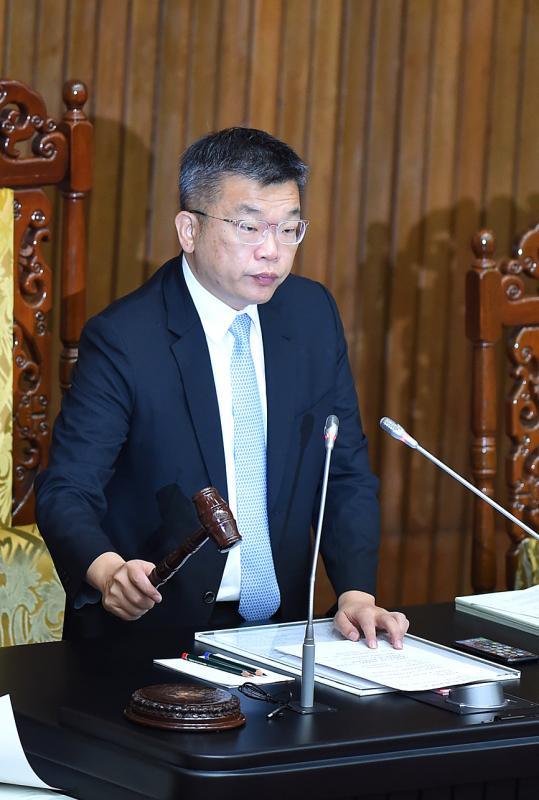The Legislative Yuan yesterday passed amendments to the Seafarers Act (船員法) that would require the owner of a vessel to obtain the crew’s written consent before a ship not protected by armed contractors sets sail in waters threatened by piracy or other unlawful forces.
Article 87 of the act stated that the owner of a vessel must obtain the written consent of the crew to operate the ship in a war zone. The amendment expands that requirement to waters threatened by piracy and illegal armed forces.
Democratic Progressive Party (DPP) Legislator Liu Chao-hao (劉櫂豪), who proposed the amendment, said that piracy and maritime terrorism are increasingly common, even as wars at sea are on the decline.

Photo: Liu Hsin-de, Taipei Times
Multiple attacks on shipping by armed African groups have been reported, including some vessels owned by Taiwanese companies, causing distress to crew members and their families, the bill’s statement of purpose says.
Additionally, insurance companies are demanding higher premiums, and there are additional costs for security measures, extra fuel and contributions to ransom payments, which would all be transferred to Taiwanese consumers, it says.
The Seafarers Act should therefore treat piracy as equivalent to war, especially after 2013 amendments to the Shipping Act (航業法) and the Fisheries Act (漁業法) that mandated owners to adopt anti-piracy security measures, it added.
The amendments make the owners of vessels liable for deaths, injuries or harm suffered by the crew due to warfare or piracy.
Meanwhile, legislators yesterday also passed amendments to the Act for Settlement of Labor-Management Disputes (勞資爭議處理法) whereby the Board for Decision on Unfair Labor Practices would have to include one to three standing members, while increasing the transparency of its rulings.
DPP Legislator Liu Chien-kuo (劉建國), Taiwan People’s Party caucus whip Lai Hsiang-ling (賴香伶) and Chinese Nationalist Party (KMT) Legislator Chiang Wan-an (蔣萬安) had separately submitted bills to amend the act.
Following cross-caucus negotiations, the bills were merged and passed, resulting in amendments to Article 43 and Article 47 of the act.
Article 43 has been amended so that the board must consist of one to three standing members among its total membership of seven to 15 experts in labor law.
The standing members would increase the board’s efficiency and professionalism, as well as protecting workers’ right to organize and join a union, and to bargain collectively, the bill says.
Article 47 has been amended to allow the board to publish its rulings on the Internet or another appropriate platform without any unnecessary censorship.
Transparency should be the guiding principle in publishing the board’s rulings so that the public can understand the legal guidelines underlying employment practices, the bill says, adding that the verdicts should not be censored except for personal information.
Plaintiffs’ and defendants’ wishes should be given less weight than the public interest when disseminating information about the Labor Union Act (工會法) and the Collective Agreement Act (團體協約法), the bill says.

ACTION PLAN: Taiwan would expand procurement from the US and encourage more companies to invest in the US to deepen bilateral cooperation, Lai said The government would not impose reciprocal tariffs in retaliation against US levies, President William Lai (賴清德) said yesterday, as he announced five strategies to address the issue, including pledging to increase Taiwanese companies’ investments in the US. Lai has in the past few days met with administrative and national security officials, as well as representatives from various industries, to explore countermeasures after US President Donald Trump on Wednesday last week announced a 32 percent duty on Taiwanese imports. In a video released yesterday evening, Lai said that Taiwan would not retaliate against the US with higher tariffs and Taiwanese companies’ commitments to

‘SPECIAL CHANNEL’: Taipei’s most important tasks are to stabilize industries affected by Trump’s trade tariffs and keep negotiations with Washington open, a source said National Security Council Secretary-General Joseph Wu (吳釗燮) arrived in the US for talks with US President Donald Trump’s administration, a source familiar with the matter said on Friday. Wu was leading a delegation for a meeting known as the “special channel,” the Financial Times reported earlier. It marked Trump’s first use of the channel since returning to the White House on Jan. 20. Citing a source familiar with the matter, the Financial Times reported that Minister of Foreign Affairs Lin Chia-lung (林佳龍) was also a part of the delegation. The visit came days after China concluded war games around Taiwan and amid Trump’s

Intelligence agents have recorded 510,000 instances of “controversial information” being spread online by the Chinese Communist Party (CCP) so far this year, the National Security Bureau (NSB) said in a report yesterday, as it warned of artificial intelligence (AI) being employed to generate destabilizing misinformation. The bureau submitted a written report to the Legislative Yuan in preparation for National Security Bureau Director-General Tsai Ming-yen’s (蔡明彥) appearance before the Foreign Affairs and National Defense Committee today. The CCP has been using cognitive warfare to divide Taiwanese society by commenting on controversial issues such as Taiwan Semiconductor Manufacturing Co’s (TSMC, 台積電) investments in the

HELPING HAND: The steering committee of the National Stabilization Fund is expected to hold a meeting to discuss how and when to utilize the fund to help buffer the sell-off The TAIEX plunged 2,065.87 points, or 9.7 percent, to close at 19,232.35 yesterday, the highest single-day percentage loss on record, as investors braced for US President Donald Trump’s tariffs after an extended holiday weekend. Amid the pessimistic atmosphere, 945 listed companies led by large-cap stocks — including Taiwan Semiconductor Manufacturing Co (TSMC, 台積電), Hon Hai Precision Industry Co (鴻海精密) and Largan Precision Co (大立光) — fell by the daily maximum of 10 percent at the close, Taiwan Stock Exchange data showed. The number of listed companies ending limit-down set a new record, the exchange said. The TAIEX plunged by daily maxiumu in just